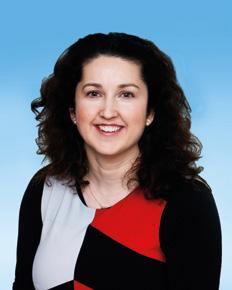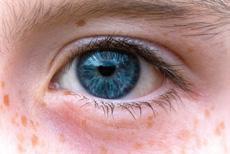
9 minute read
News
News Now
Retina conference showcased latest treatments in revolutionising eye care..
Retina, the annual conference for people with sight loss and their families, organised by Fighting Blindness, returned to Dublin recently for its first in-person event since 2019. Now in its 23rd year, Retina brings the sight loss community together with leading experts to hear about the latest treatments revolutionising eye care, to learn of the range of supports people can access, and to share stories and gain support from others on a similar journey.
It offered an ideal opportunity for attendees to quiz the experts as to their own conditions and to find out about the promising developments taking place across a range of disease areas. With latest figures showing that there are approximately 272,000 people in Ireland living with blindness or vision impairment, this event was timely, Among the speakers headlining this year’s event was be Ben Shaberman, from Foundation Fighting Blindness USA, who provided an overview of some of the cutting-edge clinical trials underway, including new gene therapies that are enabling people to put away their canes and see stars in the sky for the first time. Also speaking was Dr Nikolas Pontikos, from Moorfields Eye Hospital in the UK, who shared details of his work on the ‘Eye2Gene’ artificial intelligence medical device to accurately diagnose and personalise treatments for eye disease.

Other high-profile speakers included consultant ophthalmologists Prof. David Keegan, from the Mater Hospital, and Dr Emma Duignan, Royal Victoria Eye and Ear Hospital, on looking after our eye health, and Avril Daly, CEO of Retina International, who will addressed the importance of clinical trials being firmly focused on the patient. In addition, there were be talks on peer support and supporting partners in their role, as well as a discussion on living with sight loss at different life stages.
For Ben Shaberman, vice president science communications at the Foundation Fighting Blindness, the future for research is very exciting with new therapies coming down the tracks that have the potential to restore vision to people who are blind:
Dr Ellen Morgan Research Manager Fighting Blindness
Retina 2022 is supported by AbbVie, Novartis, Roche and Specsavers. For more information on the conference proceedings visit www.fightingblindness. ie, or follow on Twitter @fight_blindness #RetinaDublin
..And new €3m state-of-the-art eye clinic opened in Carrickmines
Optilase, one of Ireland’s leading Laser and Lens Eye Surgery clinics, has opened a new- state- of- the- art eye clinic in Carrickmines. The 6,000 square metre eye surgery clinic has been designed and fitted out with the latest technology and equipment, allowing Optilase to introduce brand new innovative treatments to its offering, including cataract surgery and intraocular lens replacement (IOLs).
At the beginning of this year, it was reported* that over 46,000 people were on the wait list for eye care within the public system. Optilase is providing refractive treatment privately to patients from as little as €198 per month**. Patients are also offered the option of interest free payment plans. Optilase, an Irish-owned business, was one of the first private eye surgery clinics established in Ireland and has grown to include a network of ten clinics. Until recently, it specialised in Laser Eye Surgery, a procedure for correcting poor vision giving patients freedom from glasses and contact lenses.
These ‘revolutionary’ new treatments including the introduction of IOL surgery involving the use of an IOL, a small lens that replaces your original lens, or sometimes is placed just behind your original lens. In addition, Optilase is providing cataract surgery which involves removing the cloudy lens and replacing it with a clear synthetic implant called an intraocular lens (IOL) which can not only remove the cataract but also can correct your vision.
Optilase offers free suitability consultations.

Practical advice for caring at Christmas for a loved one with dementia
Christmas can be a wonderful time for family and friends. At the best of times it can also be overwhelming. When caring for a loved one with dementia, it can easily feel all too much. However, with some planning and some adjustments, this holiday can be enjoyable for everyone. The Alzheimer Society of Ireland’s factsheet for families caring at Christmas provides lots of ideas to help, top tips include: • Have realistic expectations, things may need to be different but still enjoyable for everyone. • Talk to the person living with dementia about what they think about Christmas and how they would like to be involved. Consider their past attitude to Christmas. • Think about what you feel is possible and what you would like to do this year. • Talk to family and friends in advance about what you both feel is needed to make the day work for everyone. • A series of small events may work better than one large event. • Try to stagger visitors and visiting. • If the house is going to be busy, identify a quiet space that the person living with dementia can retreat to if they are feeling tired or overwhelmed. • On Christmas day involve the person living with dementia in the preparations, for example setting the table, preparing vegetables or a festive activity such as singing carols. • Build in time to do things you enjoy and make you smile • Congratulate yourself, focus on what is going well. To get your free copy of the factsheet Caring at Christmas call 1800 341 341 or visit www.alzheimer.ie
The advantaged of positive nursing home care
Recently Senor Times writer Conor O’Hagan joined the team at The Ardmore care home in North Dublin, to learn about what it’s really like to live in a nursing home environment. Conor interviewed Collette a local resident of Glasnevin and CareChoice’s Chief Marketing Officer Melanie O’Connor and was surprised to find a different story from the usual ones told about life in a nursing home environment. As you will hear throughout the recently launched Senior Times podcast, for Colette, spending time at the Ardmore was a real blessing and not only was she able to recover fully from her back surgery, but she found a new connection to the community. Among the residents at the care home Colette found new friends and plenty of great people living their lives independently, yet, safely under the respectful guidance of the home’s care staff. Conor commented: ‘It’s important for all of us to remember that every person, regardless of where they live, is a human being with history, with stories, with friends and families and in particular for those who live long enough to require nursing home care, with a life full of wisdom learned and insights gained’. The Ardmore are most certainly doing something right, and Nichola Steen, the home’s director of nursing summarized it as follows: ‘What makes the Ardmore so special is the people who work here and the residents who reside here. It epitomizes a sense of belonging, a sense of community, a sense of purpose and a sense of safety and it’s these attributes that make the Ardmore what it is.’ The Ardmore is one of 14 nursing homes in the CareChoice group spread across Leinster and Munster on the east of Ireland. For more information: phone (01) 880 0900 or email:
receptionfinglas@carechoice.ie | www.carechoice.ie
A father-of-two has paid tribute to the ‘hero’ husband-and-wife who brought him back from a sudden cardiac arrest. Jonathan Doherty, 43, passed out at home in front of his wife Claire after returning from a 5k jog and would not have survived without first-responder neighbours, Deirdre and Jonathan Roughneen. ‘I got home, jumped in the shower and started getting pains in my left arm, I thought it was muscular from the run,’ said Jonathan, recalling his brush with death in June. ‘I was trying to shake it off and couldn’t so I got into bed and called Claire, telling her I didn’t feel too well. I didn’t realise it was massive heart attack that would lead to a cardiac arrest. ‘Claire called the ambulance service, they ran through some of the symptoms and at the same time they put a call through to the first responders.’ It could have ended in tragedy - the Roughneens were seconds away from leaving home for a cycle when they got the call to attend Jonathan’s home in Kiltale, Co Meath. ‘They started CPR and did about 10 minutes, with two shocks of the defibrillator, which brought me back. The next strong memory I had was being in the back of an ambulance on the way to the Mater Hospital,” said Jonathan. ‘If it wasn’t for them, I wouldn’t have survived. I’m here today because of the actions of people who are heroes.” Now recovering with two stents in his heart, Jonathan, dad to Darragh, three, and eight-year-old Grace, also plans to train as a first responder. A total of 2,906 people suffered cardiac arrest outside hospital settings in Ireland in 2021 – 74% of which happened in the home. Our CPR bystander rates – where a cardiac arrest patient is helped by a member of the public before an emergency team arrives – is 85 per cent But less than 7 per cent are getting defibrillators onto their chests before first responders or an ambulance arrives. ‘Your chances of survival rise by 48 per cent once an AED is used on you,’ said Brigid Sinnott, Chairperson, Restart a Heart Group and Resuscitation Manager with the Irish Heart Foundation. ‘Restart a Heart Day encourages people to be aware of the steps that they can take to save a life: recognise cardiac arrest early, call for emergency help, perform CPR and get the nearest AED. ‘There may be an element of fear but remember that with CPR and an AED, you can do no harm. Make yourself familiar with your nearest AED and do not be afraid to use it. If someone is unresponsive and not breathing normally, they need CPR and an AED.’ Robert Morton, Director of the National Ambulance Service, said that improving cardiac arrest survival begins in the community.‘Early recognition, early CPR and early AED use are the keys to saving more lives. AEDs are very easy to use, so know where your nearest public AED is located because it could save someone’s life,’ he said. The four simple steps to save a life are: Check: is the person responding or breathing normally? Call: emergency services on 112 or 999 and listen carefully to the instructions the ambulance call taker provides Compress: start pressing on the centre of the patient’s chest at a speed of 100-120 compressions per minute and at a depth of two inches or 5cms Shock: If someone is with you, send them to get the nearest AED and get it on to the chest as quickly as possible.
The Out of Hospital Cardiac Arrest Strategy Group has produced a video showing the life-saving difference that Check-Call-CompressShock makes: https://vimeo.










